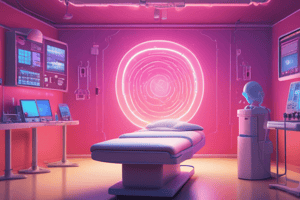Podcast
Questions and Answers
What are the three types of radiation therapy?
What are the three types of radiation therapy?
External radiation, Internal radiation therapy, and Sealed source (brachytherapy)
What are the primary goals of chemotherapy?
What are the primary goals of chemotherapy?
- Cure (correct)
- Control (correct)
- Palliation of manifestation (correct)
- All of the above
External radiation therapy requires isolation.
External radiation therapy requires isolation.
False (B)
Internal radiation therapy is where the radioisotope is placed within or near the tumor.
Internal radiation therapy is where the radioisotope is placed within or near the tumor.
What kind of radiation therapy involves the radioisotope being administered orally, intravenously, or directly into the body cavity?
What kind of radiation therapy involves the radioisotope being administered orally, intravenously, or directly into the body cavity?
What are the three principles of radiation protection?
What are the three principles of radiation protection?
What is a common side effect of chemotherapy that can occur in the GI system?
What is a common side effect of chemotherapy that can occur in the GI system?
Chemotherapy is often a recommended treatment when the disease is widespread.
Chemotherapy is often a recommended treatment when the disease is widespread.
What is a common symptom of lung cancer?
What is a common symptom of lung cancer?
What are the two main types of lung cancer?
What are the two main types of lung cancer?
Lung cancer is the most common cause of cancer mortality worldwide
Lung cancer is the most common cause of cancer mortality worldwide
What is the most common cause of lung cancer?
What is the most common cause of lung cancer?
What are some of the most common symptoms of lung cancer?
What are some of the most common symptoms of lung cancer?
The most effective treatment for lung cancer that is localized is surgery
The most effective treatment for lung cancer that is localized is surgery
Radiation therapy can be used to reduce the size of the tumor before surgery.
Radiation therapy can be used to reduce the size of the tumor before surgery.
What are some of the potential side effects of radiation therapy?
What are some of the potential side effects of radiation therapy?
What are some of the side effects of chemotherapy?
What are some of the side effects of chemotherapy?
The Whipple procedure is the most common surgical procedure for small bowel cancer.
The Whipple procedure is the most common surgical procedure for small bowel cancer.
When the Whipple procedure is completed, what is reconstructed in the digestive tract?
When the Whipple procedure is completed, what is reconstructed in the digestive tract?
Pancreatic cancer is the 4th leading cause of cancer in the United States.
Pancreatic cancer is the 4th leading cause of cancer in the United States.
The Whipple procedure is used exclusively to treat pancreatic cancer.
The Whipple procedure is used exclusively to treat pancreatic cancer.
What are some of the potential complications that could occur post-Whipple procedure?
What are some of the potential complications that could occur post-Whipple procedure?
Pancreatic cancer can be caused by genetic factors, but there is no clear cause and effect for the disease.
Pancreatic cancer can be caused by genetic factors, but there is no clear cause and effect for the disease.
What is the fifth leading cause of death from cancer in the United States?
What is the fifth leading cause of death from cancer in the United States?
The symptoms of pancreatic cancer often don't appear until the cancer has spread.
The symptoms of pancreatic cancer often don't appear until the cancer has spread.
The Whipple procedure is a palliative treatment for pancreatic cancer
The Whipple procedure is a palliative treatment for pancreatic cancer
What kind of cancer is the most common type of thyroid cancer?
What kind of cancer is the most common type of thyroid cancer?
What type of thyroid cancer is the most common in older individuals?
What type of thyroid cancer is the most common in older individuals?
Papillary carcinoma is more aggressive than follicular carcinoma.
Papillary carcinoma is more aggressive than follicular carcinoma.
What is a common symptom of thyroid cancer?
What is a common symptom of thyroid cancer?
Thyroid cancer can often cause hoarseness and difficulty speaking.
Thyroid cancer can often cause hoarseness and difficulty speaking.
The treatment for thyroid cancer is a combination of surgery, radioactive iodine treatment, chemotherapy, and radiation therapy.
The treatment for thyroid cancer is a combination of surgery, radioactive iodine treatment, chemotherapy, and radiation therapy.
Which of the following is not a component of a comprehensive treatment program for thyroid cancer?
Which of the following is not a component of a comprehensive treatment program for thyroid cancer?
Thyroid hormone replacement therapy is used to replace the hormones that the thyroid was not able to produce after a portion of the thyroid was removed.
Thyroid hormone replacement therapy is used to replace the hormones that the thyroid was not able to produce after a portion of the thyroid was removed.
The Whipple procedure is often used to treat pancreatic cancer.
The Whipple procedure is often used to treat pancreatic cancer.
It is impossible to prevent premature menopause or amenorrhea as a side effect of chemotherapy.
It is impossible to prevent premature menopause or amenorrhea as a side effect of chemotherapy.
One of the many side effects of chemotherapy is the risk of developing infections.
One of the many side effects of chemotherapy is the risk of developing infections.
It is important to use a combination of treatment methods rather than a single treatment method for lung cancer.
It is important to use a combination of treatment methods rather than a single treatment method for lung cancer.
Chemotherapy is the only treatment for lung cancer.
Chemotherapy is the only treatment for lung cancer.
Radiation therapy can be used to treat a wide range of cancer types.
Radiation therapy can be used to treat a wide range of cancer types.
Chemotherapy is often used to treat lung cancer that has metastasized, or spread to other parts of the body.
Chemotherapy is often used to treat lung cancer that has metastasized, or spread to other parts of the body.
Flashcards
Radiation Therapy
Radiation Therapy
Treatment modality using high-energy radiation to damage cancer cells' DNA and prevent reproduction.
Primary Radiation Therapy
Primary Radiation Therapy
Radiation therapy used as the sole treatment to cure cancer, like early-stage skin cancer.
Adjuvant Radiation Therapy
Adjuvant Radiation Therapy
Radiation therapy given before or after surgery to kill any remaining cancer cells.
Palliative Radiation Therapy
Palliative Radiation Therapy
Signup and view all the flashcards
Radiosensitivity
Radiosensitivity
Signup and view all the flashcards
External Radiation Therapy
External Radiation Therapy
Signup and view all the flashcards
Internal Radiation Therapy
Internal Radiation Therapy
Signup and view all the flashcards
Sealed Source Brachytherapy
Sealed Source Brachytherapy
Signup and view all the flashcards
Unsealed Source Brachytherapy
Unsealed Source Brachytherapy
Signup and view all the flashcards
Distance (Radiation Protection)
Distance (Radiation Protection)
Signup and view all the flashcards
Time Limit (Radiation Protection)
Time Limit (Radiation Protection)
Signup and view all the flashcards
Shielding (Radiation Protection)
Shielding (Radiation Protection)
Signup and view all the flashcards
Chemotherapy
Chemotherapy
Signup and view all the flashcards
Intravenous Chemotherapy
Intravenous Chemotherapy
Signup and view all the flashcards
Regional Chemotherapy
Regional Chemotherapy
Signup and view all the flashcards
Topical Chemotherapy
Topical Chemotherapy
Signup and view all the flashcards
Intra-arterial Chemotherapy
Intra-arterial Chemotherapy
Signup and view all the flashcards
Intracavity Chemotherapy
Intracavity Chemotherapy
Signup and view all the flashcards
Intraperitoneal Chemotherapy
Intraperitoneal Chemotherapy
Signup and view all the flashcards
Intrathecal Chemotherapy
Intrathecal Chemotherapy
Signup and view all the flashcards
Immunotherapy
Immunotherapy
Signup and view all the flashcards
Study Notes
Radiation Therapy
- Radiation therapy can be used as a primary, adjuvant, or palliative treatment for cancer.
- Primary modality: used to achieve a local cure (e.g., early skin cancer, Hodgkin's disease, cervical carcinoma).
- Adjuvant therapy: aids in destroying cancer cells pre- or post-operatively, often combined with chemotherapy.
- Palliative therapy: relieves pain caused by obstruction, fractures, spinal cord compression, or metastases.
- Radiosensitivity: tissues' sensitivity to radiation depends on individual cells and tissue characteristics.
- Radiation therapy's mechanism: high-energy ionizing radiation damages a cell's DNA, preventing reproduction and cell destruction.
- Types of Radiation Therapy:
- External radiation (teletherapy): uses high-energy or gamma X-ray machines (no isolation needed).
- Internal radiation therapy: administered near the tumor or into the systemic circulation.
- Sealed source brachytherapy: radioisotopes are placed within or near the tumor, avoiding contamination of urine and other bodily fluids.
- Unsealed source brachytherapy: radioisotopes are administered orally, intravenously, or instilled into body cavities; bodily fluids become contaminated.
Skincare During External RT
- Keep skin dry; do not wash the treatment area until permitted.
- When permitted, gently wash with mild soap and water, pat dry; do not rub.
- Do not use hot water, powders, creams, lotions, deodorants, or alcohol on the treatment area.
- Avoid using ointments or tapes on the treated area.
- Use an electric razor; avoid pre- and after-shave lotions.
- Protect skin from direct sunlight, chlorine, and extreme temperatures.
Chemotherapy
- Goals: cure, control, or palliation of manifestations.
- Used when the disease is widespread or if surgery is not possible, or if it is resistant to radiation.
- Common types of chemotherapy:
- Antimetabolites (e.g., 5-fluorouracil, methotrexate)
- Vinca alkaloids (e.g., vincristine)
- Taxanes (e.g., paclitaxel)
- Alkylating agents (e.g., carboplatin, cisplatin)
- Antitumor antibiotics (e.g., bleomycin, doxorubicin)
- Others (e.g., hydroxyurea)
Intravenous Chemotherapy
- Administration via IV can cause tissue necrosis; Vascular Access Devices (VADs) are preferred.
- VADs provide continuous chemotherapy and multiple access for blood work; complications include infection and obstruction.
Radiation and Chemotherapy Safety
- Wearing appropriate personal protective equipment (PPE) is vital.
- Immediate washing with soap and water is essential for skin contact.
- Follow proper disposal procedures for contaminated equipment (leak-proof, puncture-proof containers).
Complications of Chemotherapy
- Problems with the gastrointestinal system (nausea, vomiting, diarrhea, constipation).
- Problems with the genitourinary system (hemorrhagic cystitis).
- Integumentary system problems.
- Impaired renal and hepatic function.
Important Information on Lung Cancer
- Lung cancer is one of the most common causes of cancer deaths and largely due to carcinogenic effects of cigarette smoke.
- Lung cancer can arise in the bronchial walls, predominantly in the epithelium of the bronchial tree.
- Common causes of Lung Cancer: smoking, genetics, exposure to occupational or environmental carcinogens.
- Symptoms of Lung Cancer:
- Cough
- Weight loss
- Chest pain
- Shortness of breath
- Hemoptysis - coughing up blood.
Important Information on Thyroid Cancer
- Thyroid cancer accounts for approximately 5-15% of thyroid malignancies.
- Causes and risk factors include prior exposure to radiation and genetic factors.
- Symptoms can include a neck lump, neck swelling, hoarseness, difficulty swallowing or breathing, throat pain, or neck pain.
- Diagnosis involves a physical assessment, blood tests (TSH), and imaging scans (e.g., ultrasound, CT, MRI).
Important Information on Pancreatic Cancer
- Pancreatic cancer is often diagnosed late as it frequently presents with vague symptoms.
- A crucial sign and symptom is Jaundice.
- Risks associated with pancreatic cancer include cigarette smoking, excessive alcohol use, and a high-fat diet.
- Diagnostic procedures include ultrasound, CT scans, endoscopic ultrasound, and blood tests (CEA and CA19-9).
Studying That Suits You
Use AI to generate personalized quizzes and flashcards to suit your learning preferences.




